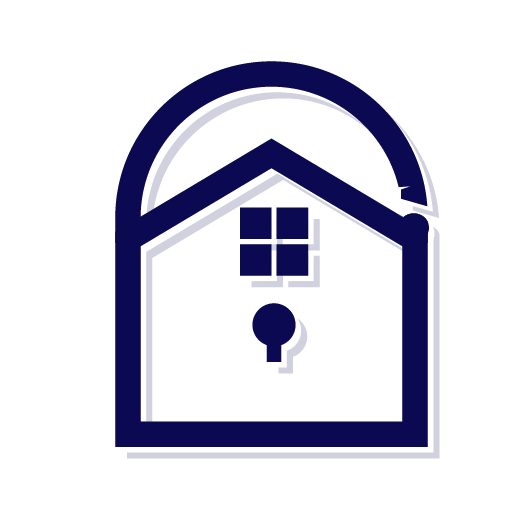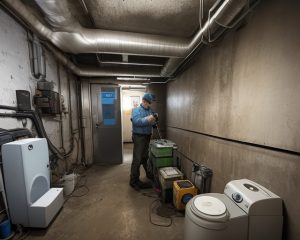Imagine checking into a hotel room and feeling like you're being observed without your knowledge, akin to the unsettling feeling of being watched without seeing anyone around.
That sense of unease is not uncommon, as hidden spy cameras can be a real threat to your privacy.
So, how can you ensure your peace of mind and protect your privacy during your hotel stay?
Importance of Checking for Spy Cameras
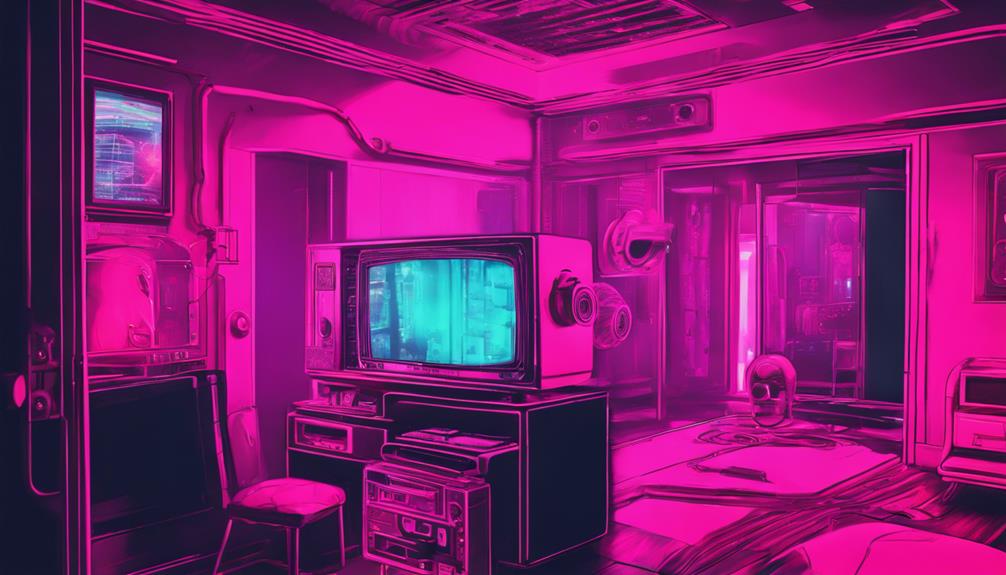
To ensure your privacy and safety, it's crucial to meticulously check for hidden spy cameras in hotel rooms. Privacy concerns are paramount in today's digital age, where the invasion of personal space can have far-reaching consequences. By implementing necessary security measures, you can take control of your surroundings and protect yourself from potential breaches.
When staying in a hotel, the feeling of relaxation and comfort shouldn't be overshadowed by worries about hidden cameras. It's essential to remember that your privacy is non-negotiable, and checking for spy cameras should be part of your routine security check. While it may seem like an inconvenience, the peace of mind that comes from knowing you aren't being watched is invaluable.
Simple yet effective security measures can be employed to detect hidden spy cameras. Start by conducting a visual inspection of the room, paying close attention to any unusual or out-of-place objects. Look for devices that may have a lens, such as smoke detectors, alarm clocks, or even electrical outlets. These common hiding spots can be hotspots for potential privacy breaches.
Common Hiding Spots to Inspect
Ensure your thorough inspection by focusing on common hiding spots where spy cameras may be concealed within hotel rooms. Begin by considering the room layout. Pay close attention to areas where a camera could have a clear view of the room, such as shelves, bedside tables, or any decorative items that seem out of place. Check behind any wall hangings, mirrors, or even smoke detectors, as these are popular spots for concealing cameras without being too obvious.
Light fixtures are another common hiding spot to inspect. Examine ceiling lights, lamps, and even alarm clocks for any unusual or extra components that don't seem to belong. Some spy cameras are designed to blend in seamlessly with these fixtures, so be thorough in your examination. Additionally, check for small pinhole cameras that could be hidden in vents or air conditioning units.
When inspecting the room layout, look for any objects that have a direct line of sight to key areas where you may discuss sensitive information or change clothes. Be mindful of items like digital alarm clocks, teddy bears, or even electrical outlets that could house tiny cameras. By being meticulous in your search of common hiding spots like room layout and light fixtures, you can increase your chances of detecting any hidden spy cameras and ensure your privacy and peace of mind during your stay.
Using a Hidden Camera Detector
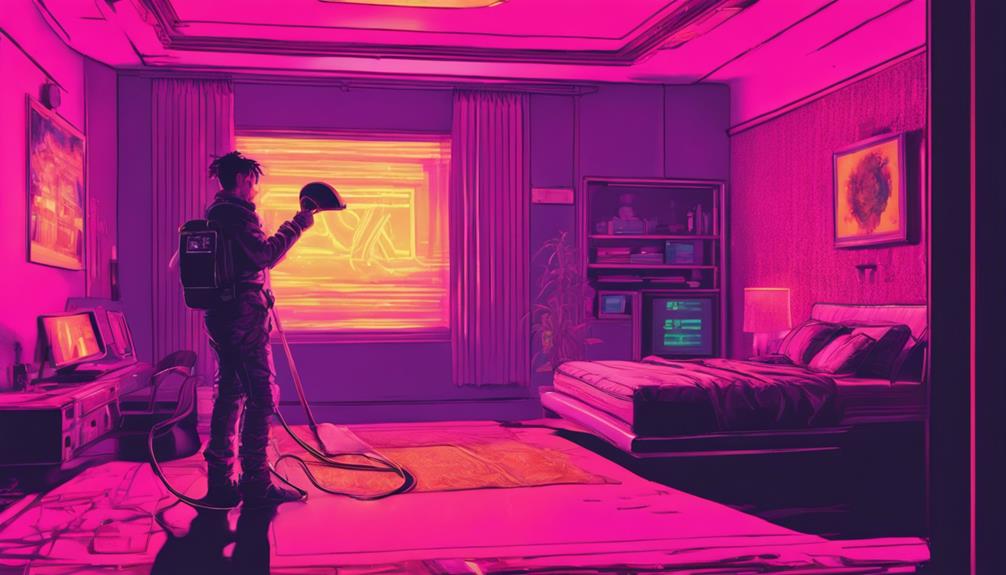
Consider utilizing a hidden camera detector to enhance your ability to detect potential spy cameras in hotel rooms efficiently. These devices leverage technology to help safeguard your privacy and peace of mind. Here's how you can make the most of using a hidden camera detector:
- Portability: Hidden camera detectors are typically compact and easy to carry, allowing you to discreetly scan different areas of the room.
- Multiple Detection Methods: These detectors often use a combination of methods such as radio frequency (RF) detection, infrared scanning, and lens detection to cover various types of hidden cameras.
- Alert Mechanisms: Look for detectors that offer visual or auditory alerts when a potential spy camera is detected, ensuring you don't miss any hidden threats.
- User-Friendly Interface: Many modern detectors come with user-friendly interfaces and simple controls, making them accessible for individuals with varying levels of technical expertise.
- Privacy Concerns: By using a hidden camera detector, you're taking proactive steps to protect your privacy and personal space, addressing legitimate concerns about unauthorized surveillance.
Conducting a Physical Inspection
When conducting a physical inspection for hidden spy cameras in a hotel room, start by systematically surveying the room from top to bottom for any unusual or out-of-place objects. Begin by examining the ceiling corners, smoke detectors, and any other fixtures for any signs of tampering or irregularities. Check for small holes or gaps that could potentially house a hidden camera. Move on to the walls, looking for any decorations, electrical outlets, or wall-mounted items that seem out of the ordinary. Pay close attention to objects that have a direct line of sight to areas where you may undress or have private conversations.
Next, scrutinize the furniture and any electronic devices in the room. Inspect alarm clocks, televisions, lamps, and even picture frames for any suspicious wires or lenses. Be thorough in your examination, as some cameras can be cleverly disguised within everyday items. Don't forget to check under the bed, inside drawers, and behind curtains or drapes. Remember, your goal is to ensure your privacy and peace of mind during your stay.
Maintaining hotel security and addressing privacy concerns is paramount in today's interconnected world. By taking these proactive measures and conducting a meticulous physical inspection, you can empower yourself to detect any hidden spy cameras that may compromise your privacy.
Checking for Suspicious Items
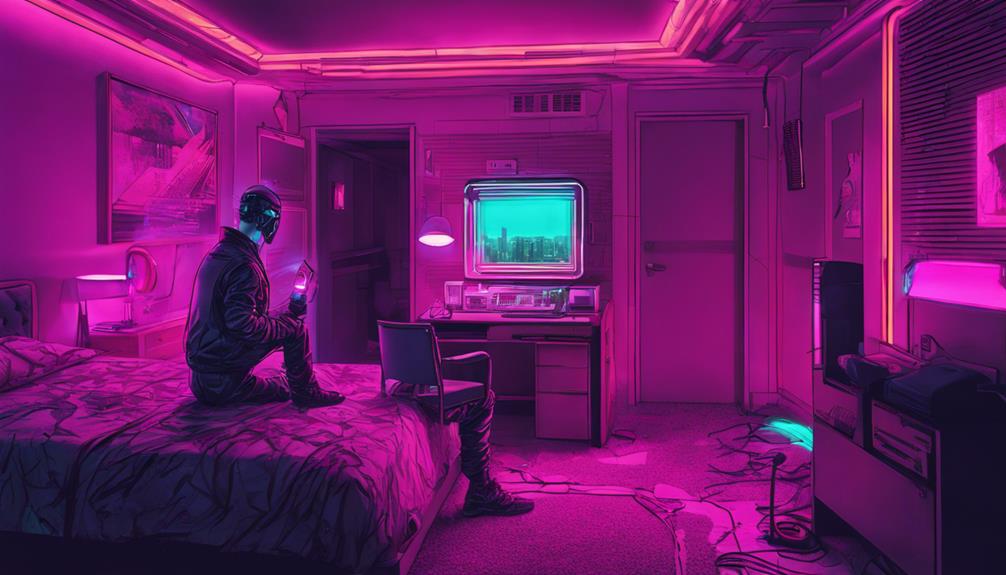
To effectively check for suspicious items in a hotel room, start by meticulously examining all surfaces and objects for any anomalies that may indicate the presence of hidden spy cameras. Ensuring your privacy and room safety is paramount, and being thorough in your inspection is key.
- Inspect Electrical Outlets: Take a close look at electrical outlets for any unusual or bulky items plugged in that could be disguised cameras.
- Check Smoke Detectors and Alarm Clocks: These common items can sometimes house hidden cameras, so examine them closely.
- Scan the Room for Any Unusual Wires: Look for wires that seem out of place or lead to unexpected locations, as they could be connected to hidden cameras.
- Examine Decorative Items: Pay attention to decorations such as pictures, mirrors, or even stuffed animals, as they could conceal cameras.
- Use a Flashlight for Reflection: Shine a flashlight around the room, looking for any glimmers or reflections that could indicate the presence of camera lenses.
Understanding Laws and Policies
Begin by familiarizing yourself with the local laws and hotel policies regarding surveillance and privacy to understand your rights and responsibilities in relation to hidden spy cameras in hotel rooms. Privacy rights are essential when it comes to protecting yourself from unauthorized surveillance. Different countries and regions have varying laws concerning surveillance in hotel rooms. Some places require hotels to disclose the presence of any cameras, while others have stricter regulations on where cameras can be placed. Understanding these laws can help you know what to expect and how to respond if you find a hidden spy camera.
Being aware of the legal implications is crucial in dealing with hidden spy cameras. In many jurisdictions, unauthorized surveillance is considered a violation of privacy rights and is illegal. If you discover a hidden camera in your hotel room, it's important to report it to the hotel management and local authorities immediately. Failure to address such violations can have serious consequences for the hotel and the individuals behind the surveillance.
Ensuring Peace of Mind

Ensuring a sense of security and tranquility is paramount when staying in a hotel room, especially in light of potential hidden surveillance devices. When facing privacy concerns, taking specific security measures can help you reclaim peace of mind:
- Perform a visual sweep: Inspect the room for any unusual or out-of-place items, focusing on common areas where spy cameras may be hidden, such as smoke detectors, alarm clocks, or even wall outlets.
- Utilize a flashlight: Shine a light around the room, looking for reflections that might indicate the presence of camera lenses. Darker areas or spots that seem oddly illuminated could be hiding a hidden camera.
- Check for strange sounds: Spy cameras often have tiny motors or mechanisms that produce faint buzzing or clicking noises. Take a moment of silence to listen for any unusual sounds that could lead you to a hidden device.
- Use a signal detector: Consider investing in a radio frequency (RF) detector to scan for wireless signals that spy cameras emit. This tool can help you locate hidden cameras that transmit data wirelessly.
- Secure your digital devices: Protect your privacy by ensuring your electronic devices are secure. Change default passwords, enable two-factor authentication, and update your software regularly to prevent unauthorized access to your data.
Frequently Asked Questions
Are Spy Cameras Typically Found in Budget Hotels or Luxury Hotels?
In general, spy cameras can be found in both budget and luxury hotels, regardless of the price point. Hotel security measures vary widely, impacting the likelihood of hidden cameras. Privacy concerns should prompt you to be vigilant regardless of the hotel's classification.
Whether budget or luxury, it's crucial to stay aware of your surroundings and take necessary precautions to ensure your privacy and security are maintained during your stay.
Can Spy Cameras Be Hidden in Electronic Devices Like TVs or Alarm Clocks?
If spy cameras are hidden in electronic devices like TVs or alarm clocks, it raises serious privacy concerns. Imagine your every move being watched without consent. This intrusion not only violates your sense of security but also breaches your right to privacy.
Furthermore, the legality of such actions must be questioned as they could have legal implications. Being vigilant about potential hidden cameras is essential to safeguard your privacy and protect your rights.
How Often Do Hotel Staff Check for and Remove Hidden Cameras?
Hotel protocols regarding surveillance vary, affecting guest privacy and security. Regular staff checks for hidden cameras play a crucial role in maintaining a safe environment. By adhering to established procedures, hotels strive to protect guests from privacy breaches.
Transparency and frequent monitoring are key aspects of maintaining a secure space. Understanding the importance of these checks can help guests feel more at ease during their stay.
Are There Any Telltale Signs That a Room May Be Monitored by Hidden Cameras?
To be aware of potential hidden cameras in hotel rooms, look for red flags that indicate surveillance. Privacy concerns arise when noticing unusual objects like smoke detectors with blinking lights or odd placements. Legal implications require hotels to disclose camera usage, so spot any suspicious items.
Check for small lenses, wires, or unusual holes in walls. Stay vigilant to protect your privacy and ensure your safety while traveling.
What Should I Do if I Find a Hidden Camera in My Hotel Room?
If you spot a hidden camera in your hotel room, the first step is to remain calm and not touch it. This discovery raises legal ramifications and privacy concerns.
Contact the hotel management immediately and notify local authorities. Document the camera's location discreetly without tampering with it.
Ensure your safety and privacy by moving to a different room. Remember, your comfort and security are paramount in such situations.
